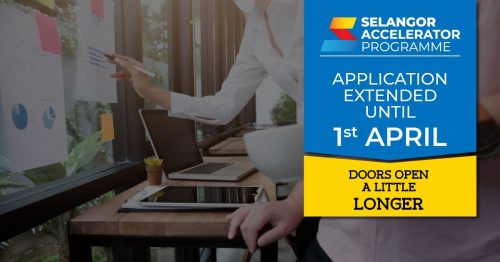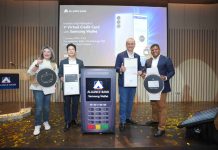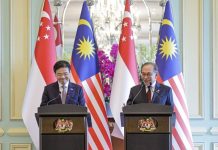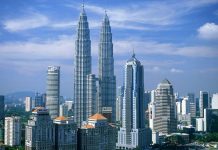- Malaysia’s Digital economy to contribute 20 percent to GDP by 2020
- Malaysian Government looking at providing perks to construction sector
- Flood warning programme can predict flood in 70 per cent of country’s river basins
- China university to host Malaysian startups from Selangor Accelerator Programme
- Malaysia makes inaugural debut as new head of the Asia-Pacific ICT Alliance (APICTA)
- Malaysia first to offer gold in exchange for recycled plastics and cans
- Valohai receives $1.8M in funding to help industries accelerate progress in machine learning
Malaysia’s Digital economy to contribute 20 percent to GDP by 2020
Digital economy will be one of the major contributors to Malaysia’s Gross Domestic Product (GDP) and is expected to achieve a target of 20 per cent by 2020 compared to the current 18.2 per cent. Deputy Minister of Communications and Multimedia, Datuk Seri Jailani Johari said in line with the rapid growth of the country’s digital economy, various initiatives and programmes were implemented under the Malaysia Digital Economic Corporation (MDEC). “Among the programmes implemented are popularising digital economy to the target groups such as youths and small entrepreneurs including those under the B40 and M40 groups. “Under this programme, the government is implementing the e-Usahawan and e-Rezeki programmes to help the people generate additional income digitally,” he told the Dewan Rakyat this morning. He added that 102,269 young and rural entrepreneurs had attended e-entrepreneurship trainings and courses. under the e-Usahawan programme. 25,792 of these participants reported additional sales of over RM175 million. Under the e-Rezeki programme, 151,198 individuals have been trained through the e-Rezeki centre and representatives nationwide and about 62,790 have managed to generate income with a total cumulative value of RM101 million, he added.
Malaysian Government looking at providing perks to construction sector
The government is looking at providing incentives to the construction industry to encourage players to migrate to sustainable construction methods and processes such as the industrialised building system (IBS), mechanisation and building information modelling (BIM). Works Minister, Datuk Seri Fadillah Yusof said at the same time, the government also aimed to get more volume from the industrial players so that the cost of doing business is cheaper, and thus get others to come on board. “We are looking at the incentives, but more importantly, it is for us to create volume so that it brings down the cost,” he told reporters in Kuala Lumpur. He said the government’s main objective in the construction industry was to ensure it embraced technology moving forward.
Flood warning programme can predict flood in 70 per cent of country’s river basins
The government is currently developing the National Flood Forecasting and Warning Programme (PRABN) which will be able to predict floods in 70 per cent of river basin areas nationwide. Minister of Natural Resources and Environment, Datuk Seri Wan Junaidi Tuanku Jaafar said the three-phase project began in 2015 and was expected to be completed by 2022. Once completed it would be able to forecast heavy rain seven days prior, and flood two days before it occurred. He said the project costing about RM550 million involved 40 river basins throughout the country.

China university to host Malaysian startups from Selangor Accelerator Programme
THE Selangor Accelerator Programme 2018 (SAP2018), organised by the Selangor Information Technology and E-Commerce Council (Sitec), welcomes one of China’s top incubators, TusStar, as a community partner. “This partnership allows us to bring our top ten startups from SAP2018 to Tsinghua University in Beijing, which is a good way for them to meet with their Chinese counterparts, and experience the startup culture there,” said Ann Lee, startup manager of Sitec. TusStar manages over 100 incubators in China, and have incubated over 5,000 startups, including 49 listed companies. The Sitec-run programme is the first in Malaysia to partner with the Beijing-based incubator. Under the MoU, top ten teams from SAP2018 will embark on a study visit and knowledge-sharing trip, which includes a demo day for them to pitch to potential investors, partners, and venture capitalists. Only 30 teams will be shortlisted for the programme. Sitec has received 33 submissions, with 24 qualifying for shortlisting. Registrations are still open, and ends on April 1.
Malaysia makes inaugural debut as new head of the Asia-Pacific ICT Alliance (APICTA)
The National ICT Association of Malaysia (PIKOM) announced that the Malaysia economy will helm the Asia Pacific ICT Alliance (APICTA) following the appointment of PIKOM Councillor Stan Singh as the new Chairman. His appointment, which was announced at the recent APICTA Exco Meeting in Myanmar also marks the first time the Malaysia economy will lead the 18-year-old global ICT alliance comprising 16 member-economies in Asia Pacific. Stan is no stranger to the ICT industry, serving almost three decades in IT management and business management roles in various industries ranging from hotel & properties, retail & supply chain management, manufacturing and finance and has led various IT & business projects in USA, UK, Australia, Hong Kong, Thailand, Indonesia, Singapore and Malaysia. He is also a business coach and an international speaker. Asia Pacific ICT Alliance, is an alliance of national ICT organisations representing their respective economy to build and enhance a mutually cooperative network to promote ICT, enhance technology innovations, capability and adoption, and encourage the development of indigenous ICT solutions for the global market.
Malaysia first to offer gold in exchange for recycled plastics and cans
MALAYSIANS will soon be the first to earn gold by recycling their plastic bottles and aluminium cans. Southeast Asian fintech firm HelloGold and Malaysia’s reverse-vending machine (RVM) company KLEAN are implementing a recycling scheme that offers Malaysians 0.00059 grams of investment-grade gold for each recycled plastic bottle and each aluminium can. Anyone can start earning gold by first downloading the HelloGold app from the Google Play Store or Apple Store and registering for an account. Once registered, users can bring their plastic bottles and aluminum cans to any KLEAN RVM for recycling. After depositing the bottles or cans in the machine, users can choose to convert their KLEAN e-credits into gold through a seamless integration between the KLEAN digital wallet and the HelloGold mobile app. Users can also register for an account at any of the forty machines that will be available across Klang Valley in July, and 500 machines across Malaysia at key locations before the end of the year.
Valohai receives $1.8M in funding to help industries accelerate progress in machine learning
Valohai, a machine learning platform-as-a-service company, has raised $1.8M in funding to help international companies accelerate machine learning development and scale their model deployment. The round was led by Nordic seed stage investment company Superhero Capital, with participation from Reaktor Ventures and Business Finland, the Finnish Funding Agency for Innovation. The Valohai platform automates the ML training and deployment infrastructure for companies who are looking to increase their business efficiency by leveraging machine learning. This scalable solution allows companies to run multiple variations of machine learning ideas in parallel, leaving developers free to focus on pushing the boundaries of their research with minimal idle time. The platform is designed to be used for peer review and open-source collaboration. Unlike many other machine learning environments, the Valohai system can track changes, build reproducible algorithms, and ensure changes in team composition do not hinder the experiment process.
























